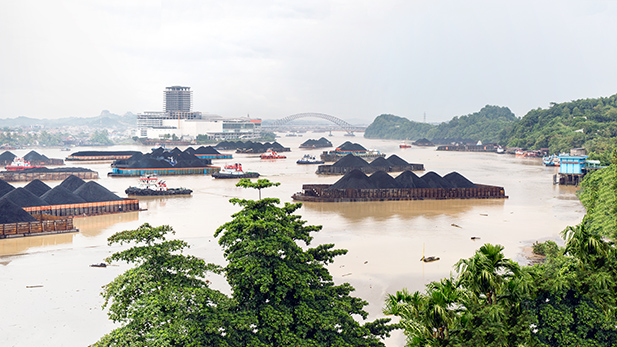World’s largest coal exporting nation needs to switch to green energy

Indonesia’s economy lives and breathes coal. In 2022, the Southeast Asian country exported 450 million tonnes of coal, which is more than 100 times the annual consumption in Denmark, placing the country at the top of the list of coal exporters worldwide. At the same time, Indonesia, a country renowned for its white sandy beaches, volcanos, partying backpackers and spiritual yoga, used more than 100 million tonnes of coal to create enough electricity for the national grid. Indonesia is somehow stuck in a black energy trap.
The country is aiming to reduce its carbon emissions by up to a third by 2030, and they need international support to get within the vicinity of that. Through Danida, the Danish Government has donated 10 million DKK to the first big research collaboration between Denmark and Indonesia: an analysis of the Indonesian energy sector across political institutions, energy companies, supply chains and lobby organisations.
Indonesia takes a severe hit
The research project will point to the barriers in Indonesia’s transition to the green energy, as Principal Investigator and Associate Professor at Copenhagen Business School (CBS), Peter Gammeltoft, explains.
“Indonesia is one of the countries that is hit hardest by climate change, not least on account of the many densely populated, low-lying coastal areas. Indonesia has an understanding of the global challenges, but nothing much happens. We can see that many green projects come across obstacles during implementation,” says Peter Gammeltoft.
He has allied himself with a group of colleagues from CBS who work with economic and technological change in emerging economies and share an interest in Indonesia, Southeast Asia and Asia. With climate change, which is possibly the most pressing global challenge right now, Indonesia presents a paradox to the researchers. The country is energy dependent on their polluting coal industry, while at the same time they are uniquely rich in alternative energy sources such as sun, wind, hydro, biomass and geothermal energy.
“Indonesians have great opportunities because of the many alternative energy sources right outside their doorstep, but the transformation from coal to renewable energy is a substantial challenge, because it carries important socio-economic consequences for, for example, certain regions and local communities,” says Peter Gammeltoft, who also speaks Indonesian.
The right man in the right place
Gammeltoft’s interest in the country, which includes Bali, Java and Borneo as well as orangutans and komodo dragons, was ignited all the way back in the late 1990s. As a PhD fellow at the Department of Geography and International Development Studies at Roskilde University (RUC), he conducted research on the technological capacity of the Indonesian electronics industry. He did field work there for a year and a half and learned the language. Since then, most of his research has been centred on R&D, innovation in technology and software as well as emerging economies’ outward investments – not only in Indonesia, but more broadly in Asia and in China specifically, as they took on the role of the world’s growth locomotive in the 2000s.
“I would have liked to continue my research on Indonesia-related matters, but after my PhD, I had to acknowledge that Denmark had no real interest in Indonesia. China grabbed everyone’s attention,” he explains.
The Danish – and global – interest in Indonesia has increased over the last decade, and perhaps now, Peter is the right man in the right place. The region offers cultural resonance and business opportunities. Among other things, Vestas has put up wind turbines with the support of development and business funding from Denmark, and ISS has a significant presence in the country with 45,000 employees. A few years ago, the Ministry of Foreign Affairs established a group that would focus on strengthening collaboration between Denmark and Indonesia in relation to teaching and research, where people from the Danish Embassy in Jakarta participated alongside university staff. Peter was one of them. He had maintained his network in Indonesia and the region and “found it highly encouraging that finally, Denmark seemed to take an interest in Indonesia.”
Severe pollution ahead
Indonesia is not only the world’s biggest exporter of coal; the country is also highly dependent on fossil fuels. The country is in the global top ten of large-scale consumers of coal and the fifth largest contributor to emissions of greenhouse gases. On the main island, Java, which has 145 million inhabitants and includes the capital city of Jakarta, they have invested so heavily in coal-fired power plants that there is excess capacity in the power grid, which makes it even harder to come up with a financial foundation for investing in alternative energy sources such as wind turbines or hydro. And future prospects are hazy.
“Big emerging economies like Indonesia are facing massive modernisation processes and an increased consumption of energy, which will lead to a severe rise in emissions and pollution. Unless they use renewable energy rather than fossil fuels,” says Peter Gammeltoft, before adding that this project will be focusing on electricity, which is the main carbon-sinner in Indonesia, as a result of their numerous coal-fired power plants.
He explains that their initial analyses of the energy sector and the conversations they have had with stakeholders made it quite clear from early on that the greatest challenge to the green transition in Indonesia – in addition to the technological and financial conditions – is related to governance, i.e. the institutional systems that govern the energy sector by way of political decisions, legislation, management, incentives, funding, demands, sanctions; that all can lead the way from the current standstill and on to a green transition.
“The country has signed international agreements on global warming and the reduction of carbon emissions, and they have also developed national legislation and regulations in this area, and yet, there is no corresponding progress. Why? That is what our project will examine, on a national, international and subnational level. Ultimately, we will also present recommendations on how to strengthen the system of governance. By way of example, the industry’s ownership structure is challenged, as is the setting of subsidies and tariffs as well as the interconnection between the various public authorities and levels,” Peter Gammeltoft explains.
The climate is a global public good
The project has among others been established with Universitas Indonesia and Universitas Padjadjaran and will train three PhD fellows in Indonesia. In addition to building research capacity in this area in both Indonesia and Denmark, the project will help strengthen the green transition through dialogue and collaborations with progressive environments and business people based on knowledge and examples from other countries that have experienced a successful green transition.
And there are even greater perspectives on the horizon for the Danish collaborators. Because it is in high-growth countries that planet Earth and its population will gain the most from investing in the green transition and reducing carbon emissions. As Peter Gammeltoft points out:
“The large Danish pension funds no longer invest massively in the green transition in Denmark, but they are very interested in projects in emerging economies where the impact is greater. As we know, the climate is a global public good, and thus it makes sense to invest where the impact will also be the greatest.”
For more information contact journalist Mikael Koldby.
